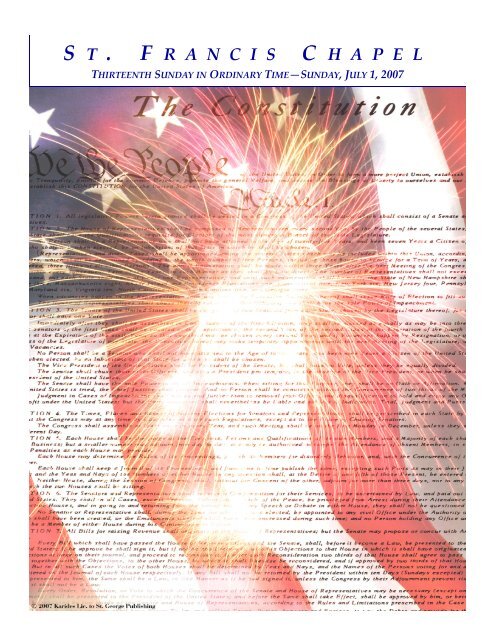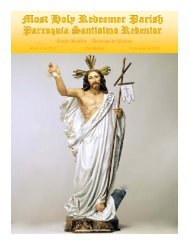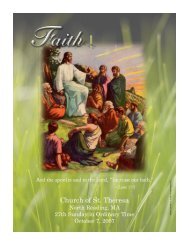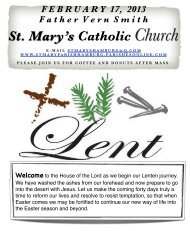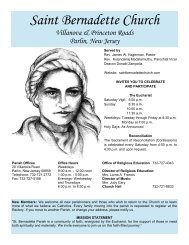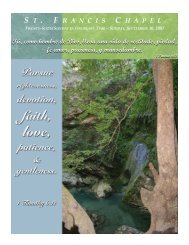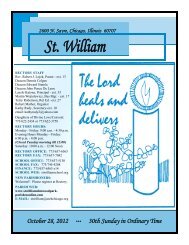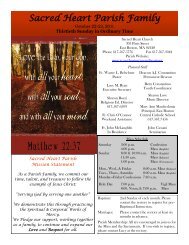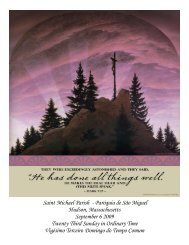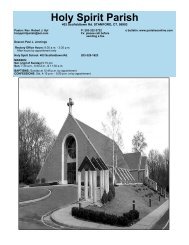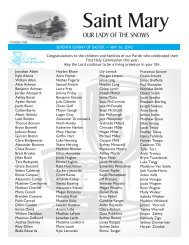S T . F R A N C I S C H A P E L
S T . F R A N C I S C H A P E L
S T . F R A N C I S C H A P E L
Create successful ePaper yourself
Turn your PDF publications into a flip-book with our unique Google optimized e-Paper software.
S T . F R A N C I S C H A P E L<br />
THIRTEENTH SUNDAY IN ORDINARY TIME—SUNDAY, JULY 1, 2007
Page 2 St. Francis Chapel Prudential Center, Boston<br />
This week we celebrate the 231 st anniversary of the<br />
birth our nation. On July 4, 1776, 56 delegates, representing<br />
the 13 Colonies, declared independence from Great Britain in a<br />
formal, signed document, which gave the rationale for the<br />
Revolutionary War. It was a war fought for the right to exist as<br />
a separate and sovereign nation, the United States of America,<br />
a democratic nation in which many rights and freedoms would<br />
be enjoyed, protected by a constitution and laws.<br />
One year of fighting preceded, and seven followed,<br />
the Declaration of Independence, until the day sovereignty was<br />
won by the new-born nation. Six years after the war’s end, its<br />
commander-in-chief was elected as its first president.<br />
The 4 th of July began to be celebrated immediately, by<br />
Gen. Washington and the troops, and after about a century this<br />
day was legislated as a national holiday. The custom is to<br />
celebrate it by rest from work, gatherings of family and friends,<br />
barbeques and fireworks.<br />
St. Paul in today’s second reading exhorts the<br />
Christians of Galatia: “Brothers and sisters: For freedom<br />
Christ set us free; so stand firm and do not submit again to the<br />
yoke of slavery.” The Apostle is not speaking about an<br />
external slavery, imposed by the will of human beings, but<br />
about an internal, intimate slavery called sin. Sin is a spiritual<br />
tyrant that chains and shackles the soul, powerfully inducing it<br />
to repeat actions that go against the law of God which is<br />
written deeply into our human nature. When the person<br />
realizes the slavery to which he or she is reduced; when the<br />
person desires to be free from that slavery, he ordinarily finds<br />
himself helpless to escape it and reclaim sovereignty of his life.<br />
Sin is the most intimate and worst form of slavery that exists.<br />
It binds not bodies but spirits, chaining them to the earth,<br />
making them incapable of soaring upward to Heaven, to God’s<br />
throne, which is our true Home.<br />
Sin has a strong and tyrannical ruler, an angel of<br />
darkness named Satan. He is the Tempter who dangles before<br />
our eyes temporary and incomplete joys, filling our minds with<br />
false promises of happiness that never come true. Once he<br />
succeeds in snaring us in sin, he closes the trap on us and binds<br />
our souls in the chains of repeated sins, which yield less and<br />
less joy and immerse the soul in deep dissatisfaction. Satan is a<br />
strong and cruel tyrant.<br />
Celebrating Our Freedom<br />
Our God is merciful, so He responded, in the fullness<br />
of time, by sending a Liberator who is stronger than Satan, the<br />
Son of God himself, born of a Virgin, whose name is Jesus,<br />
that is, God saves.<br />
Christ alone has the power to break into Satan’s dark<br />
kingdom and despoil him of his possessions, namely, souls<br />
bound by sin and doomed to eternal punishment. Christ won<br />
this victory by means of a fearsome instrument, not wielded as<br />
a weapon but on which He offered his life in a torture of<br />
unimaginable agony. The death of our Hero on the Cross won<br />
for us freedom from our cruel despot and unloosed the shackles<br />
of sin, freeing us to live as God willed, according to the law<br />
written deeply in our human nature. St. Paul summed it up in<br />
one sentence: “You shall love your neighbor as yourself.”<br />
This law is the opposite the self-indulgence and egoistic<br />
compulsion of sin. Those who live it will experience the joy of<br />
spiritual love, which is the very joy of our infinitely joyful<br />
God.<br />
As with our nation’s freedom, it is necessary to<br />
protect our spiritual freedom vigilantly. “For freedom Christ<br />
set us free; so stand firm and do not submit again to the yoke of<br />
slavery.” Paul goes on to warn us: “Do not use this freedom as<br />
an opportunity for the flesh.” Flesh, in the Apostle’s<br />
vocabulary, represents all choices against God’s law. What he<br />
is saying is: Do not return to sin. “Rather, serve one another<br />
through love.” This is true freedom and the source of true joy.<br />
We celebrate it not on the 4 th of July, but all year round, and<br />
especially on every Sunday. That day is to be celebrated by<br />
rest from work, and gathering the Lord’s family together to<br />
feast on the Word of God and the Eucharist. As Americans, we<br />
celebrate our nation’s freedom on the 4 th of July. As<br />
Christians, we celebrate our spiritual freedom each and every<br />
Sunday!<br />
Intentions of Pope Benedict XVI for the Month of July<br />
General: That all citizens, individually and in groups, may be enabled to<br />
participate actively in the life and management of the common good.<br />
Mission: That, aware of their own missionary duty, all Christians may actively<br />
help all those engaged in the evangelization of peoples.<br />
Fr. Craig
Esta semana celebramos el aniversario 231 del<br />
nacimiento de nuestra nación. El 4 julio 1776, 56 delegados,<br />
representantes de las 13 Colonias, declararon independencia de<br />
Gran Bretaña con un documento formal, firmado, que dio las<br />
razones de la Guerra revolucionaria. Fue una guerra librada<br />
para el derecho de existir como una nación separada y<br />
soberana, los Estados Unidos de América, una nación<br />
democrática en la cual muchos derechos y libertades serían<br />
gozados, protegidos por una constitución y leyes.<br />
Un año de combates precedió, y siete siguieron, la<br />
Declaración de la Independencia, hasta el día en el que la<br />
soberanía fue conquistada por la nación recién nacida. Seis<br />
años después del fin de la guerra, su comandante en jefe fue<br />
elegido como el primer presidente.<br />
El 4 de julio comenzó a ser celebrado enseguida por<br />
Gral. Washington y las tropas, y después de un siglo más o<br />
menos, este día fue legislado como un feriado nacional. La<br />
costumbre es de celebrarlo con descanso del trabajo, reuniones<br />
de familia y amigos, barbacoas y fuegos artificiales.<br />
San Pablo en la segunda lectura hoy exhorta a los<br />
cristianos de Galacia: “Hermanos: Cristo nos ha liberado para<br />
que seamos libres. Conserven, pues, la libertad y no se<br />
sometan de nuevo al yugo de la esclavitud.” El Apóstol no<br />
está hablando de una esclavitud exterior, impuesta por voluntad<br />
de seres humanos, sino una esclavitud interior, íntima, llamada<br />
pecado. El pecado es un tirano espiritual que encadena y pone<br />
grilletes al alma, induciéndola forzosamente a repetir acciones<br />
las que van contra la ley de Dios que está escrita<br />
profundamente en nuestra naturaleza humana. Cuando la<br />
persona se dé cuenta de la esclavitud a la que es reducida;<br />
cuando la persona desee ser liberada de esa esclavitud, se<br />
encuentra ordinariamente incapaz de escaparse de esa y<br />
retomar la soberanía de su vida. El pecado es la forma de<br />
esclavitud más íntima y peor que exista. Vincula no a los<br />
cuerpos sino a los espíritus, encadenándolos a la tierra,<br />
haciéndolos incapaces de remontarse hacia el cielo, al trono de<br />
Dios, el que es nuestra Casa verdadera.<br />
El pecado tiene un gobernante fuerte y tirano, un<br />
ángel de la oscuridad llamado Satanás. Él es el Tentador que<br />
hace oscilar ante de nuestros ojos gozos temporales e<br />
incompletas, llenando nuestras mentes con promesas falsas de<br />
felicidad las que jamás se cumplan. Una vez logra cazarnos en<br />
el pecado, cierra la trampa y ata nuestras almas con las cadenas<br />
de pecados repetidos, que cada vez dan menos alegría y<br />
sumerge al alma en insatisfacción profunda. Satanás es un<br />
tirano fuerte y cruel.<br />
Nuestro Dios, en cambio, es misericordioso, y así<br />
entonces respondió, en la plenitud de los tiempos, enviando a<br />
un Libertador que es más fuerte que Satanás, el mismo Hijo de<br />
Dios, nacido de una Virgen, de quien el nombre es Jesús, o sea,<br />
Dios salva.<br />
Sólo Cristo tiene el poder de penetrar al reino oscuro<br />
Oblates of the Virgin Mary<br />
Para celebrar nuestra Libertad<br />
Page 3<br />
de Satanás y de despojarlo de sus posesiones, que son las almas<br />
atadas con el pecado y destinadas a castigos eternos. Cristo<br />
consiguió esta victoria por medio de un instrumento terrible, no<br />
blandido como un arma sino en el que se ofreció la vida en una<br />
tortura de agonía inconcebible. La muerte de nuestro Héroe en<br />
la Cruz nos consiguió la libertad de aquel déspota cruel y<br />
desató los grilletes del pecado, liberándonos vivir como Dios<br />
ha querido, según la ley escrita profundamente en nuestra<br />
naturaleza humana. San Pablo la resumió en un mandamiento:<br />
“Amarás a tu prójimo como a ti mismo.” Esta ley es la<br />
contraria de la autocomplacencia y la compulsión egoísta del<br />
pecado. Los que la cumplen experimentarán la alegría del<br />
amor espiritual, la que es la alegría misma de nuestro Dios<br />
infinitamente alegre.<br />
Como con la libertad de nuestra nación, hay que<br />
proteger con vigilancia nuestra libertad espiritual. “Cristo nos<br />
ha liberado para que seamos libres. Conserven, pues, la<br />
libertad y no se sometan de nuevo al yugo de la esclavitud.”<br />
Pablo sigue para advertirnos: “Pero cuiden de no tomarla [la<br />
libertad cristiana] como pretexto para satisfacer su egoísmo.”<br />
Lo que nos dice es: No volver al pecado. “Antes bien, háganse<br />
servidores los unos de los otros por amor.” Esta es la<br />
verdadera libertad y la fuente de la alegría verdadera. La<br />
celebramos no sólo el 4 de julio sino también durante todo el<br />
año, y especialmente en cada Domingo. Ese día debemos<br />
celebrar descansando del trabajo y reuniéndonos en la familia<br />
del Señor para darnos un banquete de la Palabra de Dios y de la<br />
Eucaristía. Como estadounidenses, celebramos la libertad de<br />
nuestra nación el 4 de julio. ¡Y como cristianos, celebramos<br />
nuestra libertad espiritual todos y cada uno de los Domingos!<br />
“Que habite en ustedes la Palabra de Cristo<br />
con toda su riqueza...” (Col. 3:16)<br />
ENCUENTROS DE ORACION BIBLICA<br />
— para todos —<br />
aquí en la Capilla St. Francis:<br />
todos los lunes,<br />
de 6:00 a 7:00 p.m.<br />
P. David, OMV<br />
P. Craig
Page 4 St. Francis Chapel Prudential Center, Boston<br />
“The great question that will be<br />
with us throughout this entire<br />
book: What did Jesus bring, if<br />
not world peace, universal<br />
prosperity, and a better world?<br />
What has he brought? The<br />
answer is very simple: God.<br />
He has brought God.”<br />
- Pope Benedict XVI<br />
from his new book, “Jesus of Nazareth.”<br />
Jesus of Nazareth<br />
a new book by Pope Benedict XVI<br />
Now available for purchase<br />
at St. Francis Chapel Bookstore!<br />
ST. CLEMENT YOUNG ADULTS<br />
Every Monday evening from 7-8 PM.<br />
Join other Catholic young adults in<br />
their 20’s and 30’s to share<br />
reflections on the Sunday scripture<br />
readings.<br />
St. Clement Shrine<br />
1105 Boylston Street<br />
(One block west of Mass. Ave)<br />
617-266-5999<br />
Summer Food Service<br />
Program for Kids:<br />
Food That’s In<br />
When School Is Out<br />
For more information, call Project Bread’s Food Source Hotline<br />
1-800-645-8333<br />
Or visit: www.meals4kids.org<br />
PREGNANCY HELP<br />
Pregnancy Help can assist you with<br />
*Free Pregnancy Testing<br />
*Friendship Counseling and Support<br />
*Material Assistance<br />
*Adoption Information and Referrals<br />
*Education, Career & Housing Info<br />
*Pre-Natal Care Referrals<br />
call toll-free: 888 771-3914<br />
www.pregnancyhelpboston.org<br />
All Services are free and confidential<br />
Also available in Spanish and Portuguese<br />
Sponsored by the Archdiocese of Boston
St. Maria Goretti<br />
Virgin and Martyr<br />
July 6<br />
Born in Corinaldo, Ancona, Italy, on October 16 1890; her<br />
farmworker father moved his family to Ferrier di Conca, near<br />
Anzio. Her father died of malaria and her mother had to struggle<br />
to feed her children.<br />
In 1902 an eighteen-year-old neighbor, Alexander, grabbed her<br />
from her steps and tried to rape her. When Maria said that she<br />
would rather died than submit, Alexander began stabbing her<br />
with a knife.<br />
As she lay in the hospital, she forgave Alexander before she<br />
died. Her death didn't end her forgivness, however.<br />
Alexander was captured and sentenced to thirty years. He was<br />
unrepentant until he had a dream that he was in a garden. Maria<br />
was there and gave him flowers. When he woke, he was a<br />
changed man, repenting of his crime and living a reformed life.<br />
When he was released after 27 years he went directly to Maria's<br />
mother to beg her forgiveness, which she gave. "If my daughter<br />
can forgive him, who am I to withold forgiveness," she said.<br />
When Maria was declared a saint by Pope Pius XII 1950,<br />
Alexander was there in the St. Peter's crowd to celebrate her<br />
canonization. Also present at the ceremony was Maria’s mother,<br />
who is thought to be the only person in history to attend the<br />
canonization ceremony of one of her own children.<br />
She is called a martyr because she fought against Alexander's<br />
attempts at sexual assault. However, the most important aspect<br />
of her story is her forgiveness of her attacker -- her concern for<br />
her enemy extending even beyond death. Her feast day is July 6.<br />
St. Maria Goretti is the patroness of youth and for the victims of<br />
rape.<br />
Oblates of the Virgin Mary<br />
Santa María Goretto<br />
Virgen y Mártir<br />
6 de Julio<br />
Page 5<br />
Santa María Goretti nació en Corinaldo, Italia el 16 de octubre<br />
de 1890 hija de Luis Goretti y Asunta Carlini, tuvieron seis<br />
hijos. Emigran a Ferrieri di Conca y trabajan como colonos, eran<br />
terrenos malsanos y el padre murió pronto.<br />
Quedaron solos Asunta y sus hijos, el mayor contaba con tan<br />
solo 13 años y María la segunda tenía diez años cuando esto<br />
sucedió. Asunta tuvo que trabajar dejando la casa y los<br />
hermanos mayores a cargo de esta. Siempre trato de darles<br />
buena educación a sus hijos y desde que aprendían a hablar les<br />
enseñaba la señal de la Cruz y a rezar las oraciones.<br />
A los once años, María hizo su primera comunión haciéndose,<br />
desde entonces, el firme propósito de morir antes que cometer<br />
un pecado.<br />
Cuando tenía apenas 12 años, se opuso a las propuestas<br />
deshonestas de un joven vecino llamado Alejandro Serenelli.<br />
Ciego por la pasión, ante la resistencia de María, el muchacho la<br />
hirió gravemente con un cuchillo dándole 14 heridas en el<br />
vientre y en el pecho.<br />
María no murió inmediatamente, fue trasladada a la hospital de<br />
San Juan de Dios donde los médicos la operaron sin anestesia<br />
porque no había y durante dos horas la santa soportó el<br />
sufrimiento ofreciendo a Dios sus dolores. María murió al día<br />
siguiente, después de decir: “Sí, yo perdono a Alejandro por<br />
amor a Jesús, y quiero que también él vaya al cielo conmigo”.<br />
Alejandro fue condenado a 30 años de prisión pronto se<br />
arrepintió y por buena conducta le condonaron 3 años de cárcel.<br />
Fue canonizada en 1950, estando presente su madre y Alejandro<br />
quien se convertido interiormente, luego de haber purgado la<br />
sentencia impuesta por la ley civil. Pidamos a “Marietta”<br />
conservar la virtud de la santa pureza. Que prefiramos perder<br />
cualquier otra amistad, antes que perder la amistad con Dios.
Page 6 St. Francis Chapel Prudential Center, Boston<br />
Benedict XVI: Sacramentum Caritatis (37-39)<br />
The Eucharist and the risen Christ<br />
37. Since the eucharistic liturgy is essentially an actio<br />
Dei which draws us into Christ through the Holy<br />
Spirit, its basic structure is not something within our<br />
power to change, nor can it be held hostage by the<br />
latest trends. Here too Saint Paul's irrefutable<br />
statement applies: "no one can lay any foundation<br />
other than the one that has been laid, which is Jesus<br />
Christ" (1 Cor 3:11). Again it is the Apostle of the<br />
Gentiles who assures us that, with regard to the<br />
Eucharist, he is presenting not his own teaching but<br />
what he himself has received (cf. 1 Cor 11:23). The<br />
celebration of the Eucharist implies and involves the<br />
living Tradition. The Church celebrates the<br />
eucharistic sacrifice in obedience to Christ's<br />
command, based on her experience of the Risen Lord<br />
and the outpouring of the Holy Spirit. For this reason,<br />
from the beginning, the Christian community has<br />
gathered for the fractio panis on the Lord's Day.<br />
Sunday, the day Christ rose from the dead, is also the<br />
first day of the week, the day which the Old<br />
Testament tradition saw as the beginning of God's<br />
work of creation. The day of creation has now<br />
become the day of the "new creation," the day of our<br />
liberation, when we commemorate Christ who died<br />
and rose again (113).<br />
Ars celebrandi<br />
38. In the course of the Synod, there was frequent<br />
insistence on the need to avoid any antithesis between<br />
the ars celebrandi, the art of proper celebration, and<br />
the full, active and fruitful participation of all the<br />
faithful. The primary way to foster the participation<br />
of the People of God in the sacred rite is the proper<br />
celebration of the rite itself. The ars celebrandi is the<br />
best way to ensure their actuosa participatio. (114)<br />
The ars celebrandi is the fruit of faithful adherence to<br />
the liturgical norms in all their richness; indeed, for<br />
two thousand years this way of celebrating has<br />
sustained the faith life of all believers, called to take<br />
part in the celebration as the People of God, a royal<br />
priesthood, a holy nation (cf. 1 Pet 2:4-5, 9) (115).<br />
The Bishop, celebrant par excellence<br />
39. While it is true that the whole People of God<br />
participates in the eucharistic liturgy, a correct ars<br />
celebrandi necessarily entails a specific responsibility<br />
on the part of those who have received the sacrament<br />
of Holy Orders. Bishops, priests, and deacons, each<br />
according to his proper rank, must consider the<br />
celebration of the liturgy as their principal duty (116).<br />
Above all, this is true of the Diocesan Bishop: as "the<br />
chief steward of the mysteries of God in the particular<br />
Church entrusted to his care, he is the moderator,<br />
promoter, and guardian of the whole of its liturgical<br />
life" (117). This is essential for the life of the<br />
particular Church, not only because communion with<br />
the Bishop is required for the lawfulness of every<br />
celebration within his territory, but also because he<br />
himself is the celebrant par excellence within his<br />
Diocese (118). It is his responsibility to ensure unity<br />
and harmony in the celebrations taking place in his<br />
territory. Consequently the Bishop must be<br />
"determined that the priests, the deacons, and the lay<br />
Christian faithful grasp ever more deeply the genuine<br />
meaning of the rites and liturgical texts, and thereby<br />
be led to an active and fruitful celebration of the<br />
Eucharist" (119). I would ask that every effort be<br />
made to ensure that the liturgies which the Bishop<br />
celebrates in his Cathedral are carried out with<br />
complete respect for the ars celebrandi, so that they<br />
can be considered an example for the entire Diocese<br />
(120).
Oblates of the Virgin Mary<br />
Benedicto XVI: Sacramentum Caritatis (37-39)<br />
Eucaristía y Cristo resucitado<br />
37. Puesto que la liturgia eucarística es esencialmente<br />
actio Dei que nos une a Jesús a través del Espíritu, su<br />
fundamento no está sometido a nuestro arbitrio ni<br />
puede ceder a la presión de la moda del momento. En<br />
esto también es válida la afirmación indiscutible de<br />
san Pablo: « Nadie puede poner otro cimiento fuera<br />
del ya puesto, que es Jesucristo » (1 Co 3,11). El<br />
Apóstol de los gentiles nos asegura además que, por<br />
lo que se refiere a la Eucaristía, no nos transmite su<br />
doctrina personal, sino lo que él, a su vez, recibió (cf.<br />
1 Co 11,23). En efecto, la celebración de la Eucaristía<br />
implica la Tradición viva. A partir de la experiencia<br />
del Resucitado y de la efusión del Espíritu Santo, la<br />
Iglesia celebra el Sacrificio eucarístico obedeciendo<br />
el mandato de Cristo. Por este motivo, al inicio, la<br />
comunidad cristiana se reúne el día del Señor para la<br />
fractio panis. El día en que Cristo resucitó de entre<br />
los muertos, el domingo, es también el primer día de<br />
la semana, el día que según la tradición<br />
veterotestamentaria representaba el principio de la<br />
creación. Ahora, el día de la creación se ha<br />
convertido en el día de la « nueva creación », el día<br />
de nuestra liberación en el que conmemoramos a<br />
Cristo muerto y resucitado.[113]<br />
Ars celebrandi<br />
38. En los trabajos sinodales se ha insistido varias<br />
veces en la necesidad de superar cualquier posible<br />
separación entre el ars celebrandi, es decir, el arte de<br />
celebrar rectamente, y la participación plena, activa y<br />
fructuosa de todos los fieles. Efectivamente, el primer<br />
modo con el que se favorece la participación del<br />
Pueblo de Dios en el Rito sagrado es la adecuada<br />
celebración del Rito mismo. El ars celebrandi es la<br />
mejor premisa para la actuosa participatio.[114] El<br />
ars celebrandi proviene de la obediencia fiel a las<br />
normas litúrgicas en su plenitud, pues es<br />
precisamente este modo de celebrar lo que asegura<br />
desde hace dos mil años la vida de fe de todos los<br />
creyentes, los cuales están llamados a vivir la<br />
celebración como Pueblo de Dios, sacerdocio real,<br />
nación santa (cf. 1 P 2,4-5.9).[115]<br />
El Obispo, liturgo por excelencia<br />
Page 7<br />
39. Si bien es cierto que todo el Pueblo de Dios<br />
participa en la Liturgia eucarística, en el correcto ars<br />
celebrandi desempeñan un papel imprescindible los<br />
que han recibido el sacramento del Orden. Obispos,<br />
sacerdotes y diáconos, cada uno según su propio<br />
grado, han de considerar la celebración como su<br />
deber principal.[116] En primer lugar el Obispo<br />
diocesano: en efecto, él, como « primer dispensador<br />
de los misterios de Dios en la Iglesia particular a él<br />
confiada, es el guía, el promotor y custodio de toda la<br />
vida litúrgica ».[117] Todo esto es decisivo para la<br />
vida de la Iglesia particular, no sólo porque la<br />
comunión con el Obispo es la condición para que<br />
toda celebración en su territorio sea legítima, sino<br />
también porque él mismo es por excelencia el liturgo<br />
de su propia Iglesia.[118] A él corresponde<br />
salvaguardar la unidad concorde de las celebraciones<br />
en su diócesis. Por tanto, ha de ser un « compromiso<br />
del Obispo hacer que los presbíteros, diáconos y los<br />
fieles comprendan cada vez mejor el sentido<br />
auténtico de los ritos y los textos litúrgicos, y así se<br />
les guíe hacia una celebración de la Eucaristía activa<br />
y fructuosa ».[119] En particular, exhorto a cumplir<br />
todo lo necesario para que las celebraciones litúrgicas<br />
oficiadas por el Obispo en la iglesia Catedral respeten<br />
plenamente el ars celebrandi, de modo que puedan<br />
ser consideradas como modelo para todas las iglesias<br />
de su territorio.[120]
Page 8 St. Francis Chapel Prudential Center, Boston
Oblates of the Virgin Mary<br />
Page 9
Page 10 St. Francis Chapel Prudential Center, Boston<br />
Who are we? Where are we?<br />
OMV FORMATION CENTER<br />
Cebu City, Philippines<br />
Fr. Bruno<br />
Lanteri<br />
(1759-1830)<br />
The Founder of the<br />
Oblates of the Virgin Mary.<br />
Declared “Venerable”:<br />
the first step on the road<br />
to sainthood.<br />
ST. PETER CHANEL PARISH<br />
Hawaiian Gardens, CA<br />
HOLY GHOST PARISH<br />
& LANTERI CENTER<br />
FOR IGNATIAN SPIRITUALITY<br />
Denver, CO<br />
The Oblates of the Virgin Mary is an international religious<br />
community of priests and brothers serving in Italy, France,<br />
Austria, Argentina, Brazil, Canada, Nigeria, the United<br />
States and the Philippines. The Oblates are involved in<br />
retreat and parish missions, spiritual direction, parish work,<br />
the mass media, clergy formation, and the foreign missions.<br />
The US Province of the Oblates of the Virgin Mary is<br />
dedicated to St. Ignatius of Loyola, and includes<br />
communities in Massachusetts, Illinois, Colorado,<br />
California and the Philippines.<br />
ST. CLEMENT EUCHARISTIC SHRINE & ST FRANCIS CHAPEL, Boston. MA<br />
ST. JOSEPH HOUSE, Milton, MA<br />
The OMV motto,<br />
ST. MARY PARISH<br />
Alton, IL<br />
“MARIAM COGITA, MARIAM INVOCA”<br />
“THINK OF MARY, CALL ON MARY”<br />
is taken from a homily by St. Bernard<br />
on the Blessed Virgin
S T . F R A N C I S<br />
C H A P E L<br />
800 Boylston Street<br />
Suite 1001<br />
Boston, MA 02199<br />
617-437-7117<br />
www.stfrancischapel.org<br />
www.oblatesofthevirginmary.org<br />
St. Francis Chapel is staffed by the<br />
Oblates of the Virgin Mary.<br />
CHAPEL STAFF<br />
Fr. John Wykes, OMV<br />
director@stfrancischapel.org<br />
Fr. Dennis Brown, OMV<br />
evangelization@aol.com<br />
Fr. Craig MacMahon, OMV<br />
Fr. Dave Yankauskas, OMV<br />
Fr. Robert Lowrey, OMV<br />
Sacristan, Mary Inoue<br />
Webmaster, Allan Ong<br />
webmaster@stfrancischapel.org<br />
Music Ministry:<br />
Elisabeth Pifer<br />
Kim Araiza<br />
Rebecca Martin<br />
Victor Zalazar<br />
Oblates of the Virgin Mary<br />
MASS INTENTIONS THIS WEEK<br />
(MASSES THAT DO NOT APPEAR HERE WERE SCHEDULED AFTER THIS<br />
BULLETIN WAS SENT TO THE PRINTER).<br />
Sunday, July 1<br />
8:00 AM +Ramon Sanchez<br />
9:15 AM Maria Sun<br />
10:30 AM Fr. Edward Broom<br />
11:45 AM +Frederick and Jane Hynes<br />
1:15 PM +Ines y Cristobal de Jesús Cabrera<br />
(el dia del Padre)<br />
4:00 PM Mary Hynes<br />
5:30 PM +Pat Nicgorski<br />
Monday, July 2<br />
8:00 AM Maria Sun<br />
12:05 PM Fr. Edward Broom<br />
12:35 PM +Daniel J. Imperato<br />
4:45 PM +Cipriano & Marciana Vasquez<br />
Tuesday, July 3<br />
8:00 AM Rev Leonard Copeland, OCD<br />
12:05 PM Maria Sun<br />
12:35 PM +Margaret O’Connor<br />
4:45 PM Fr. Edward Broom<br />
Wednesday, July 4: Happy 4th of July!<br />
9:00 AM +John Molloy, Jr.<br />
12:00 PM Fr. Edward Broom<br />
CHAPEL CLOSES AFTER THE NOON MASS<br />
Thursday, July 5<br />
8:00 AM Fr. Edward Broom<br />
12:05 PM James, Amy, & Benjamin Ooi<br />
12:35 PM +Souls in Purgatory (sp. int.)<br />
4:45 PM Maria Sun<br />
Friday, July 6<br />
8:00 AM +Frederick and Jane Hynes<br />
12:05 PM Mary Hynes<br />
12:35 PM Venice Saad<br />
(for health and healing)<br />
4:45 PM Aubur Higgins<br />
Saturday, July 7<br />
9:00 AM Miriam B. Serra & Salvi Serra<br />
12:00 PM +Maria Carvalho<br />
4:00 PM +Marie Griffin<br />
5:30 PM +Patrick Ridge<br />
7:00 PM Accion de gracias (15 años)<br />
Silvia Quiñones<br />
Bible Study<br />
Wednesdays 6-7 p.m.<br />
with<br />
Fr. Craig MacMahon, OMV &<br />
Fr. Dave Yankauskas, OMV<br />
Weekend Masses<br />
Saturday<br />
4:00 PM, 5:30 PM<br />
7:00 PM en espanol<br />
Sunday<br />
8:00 AM, 9:15 AM<br />
10:30 AM, 11:45 AM<br />
1:15 PM en espanol<br />
4:00 PM, 5:30 PM<br />
Weekday Masses<br />
Monday - Friday<br />
8:00 AM, 12:05 PM<br />
12:35 PM, 4:45 PM<br />
Saturday<br />
9:00 AM, 12 Noon<br />
Page 11<br />
Confessions<br />
Monday - Friday<br />
8:30 - 11:50 AM*, 1:10 - 4:15 PM<br />
*Wed 11:15 - 11:50<br />
Saturday<br />
9:45 - 11:45 AM, 12:45-3:30 PM<br />
Exposition of the<br />
Blessed Sacrament<br />
Monday - Friday<br />
8:30-11:45 AM, 1:00-4:30 PM<br />
Saturday 9:30—11:30 AM<br />
12:30—3:30 PM<br />
Sunday 2:30-3:30 PM<br />
Devotions<br />
Tuesday: Blessed Virgin Mary<br />
Thursday: St. Jude<br />
Rosary<br />
Monday - Friday<br />
after 4:45 PM Mass


